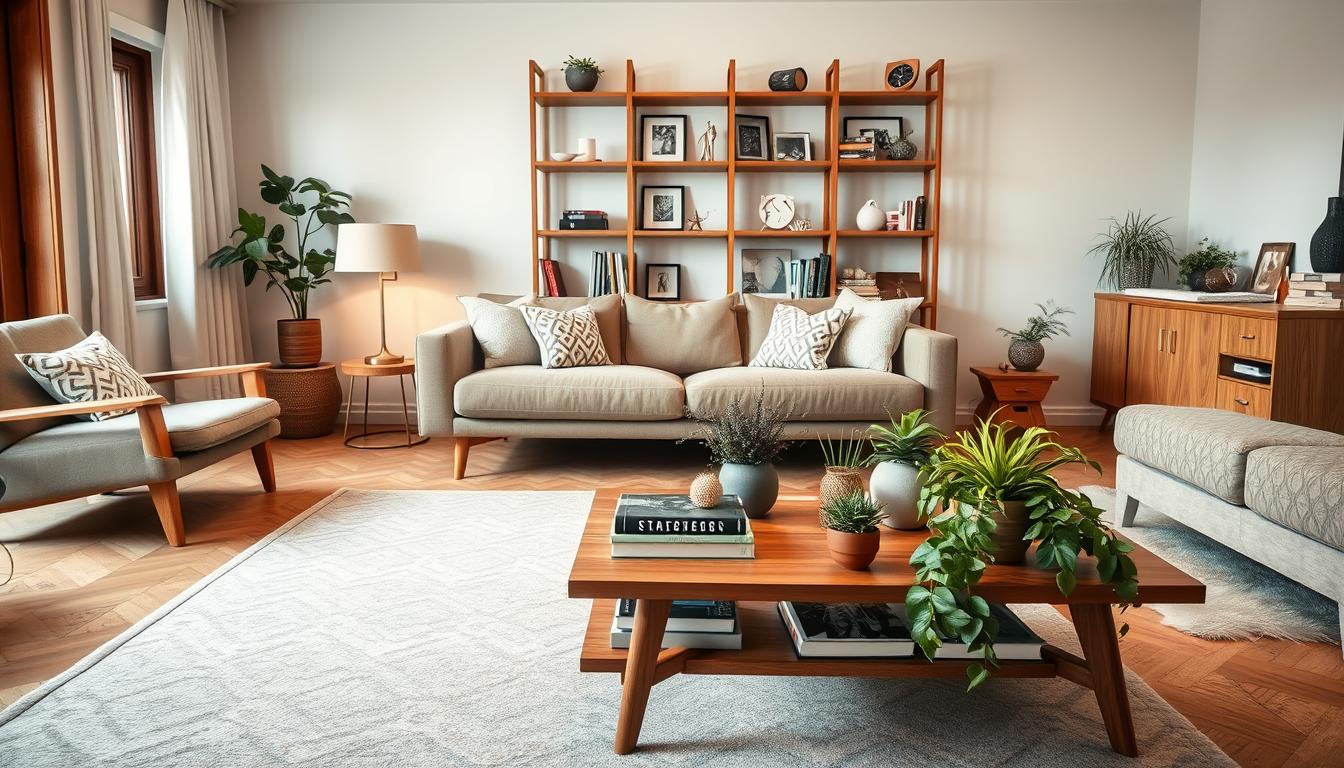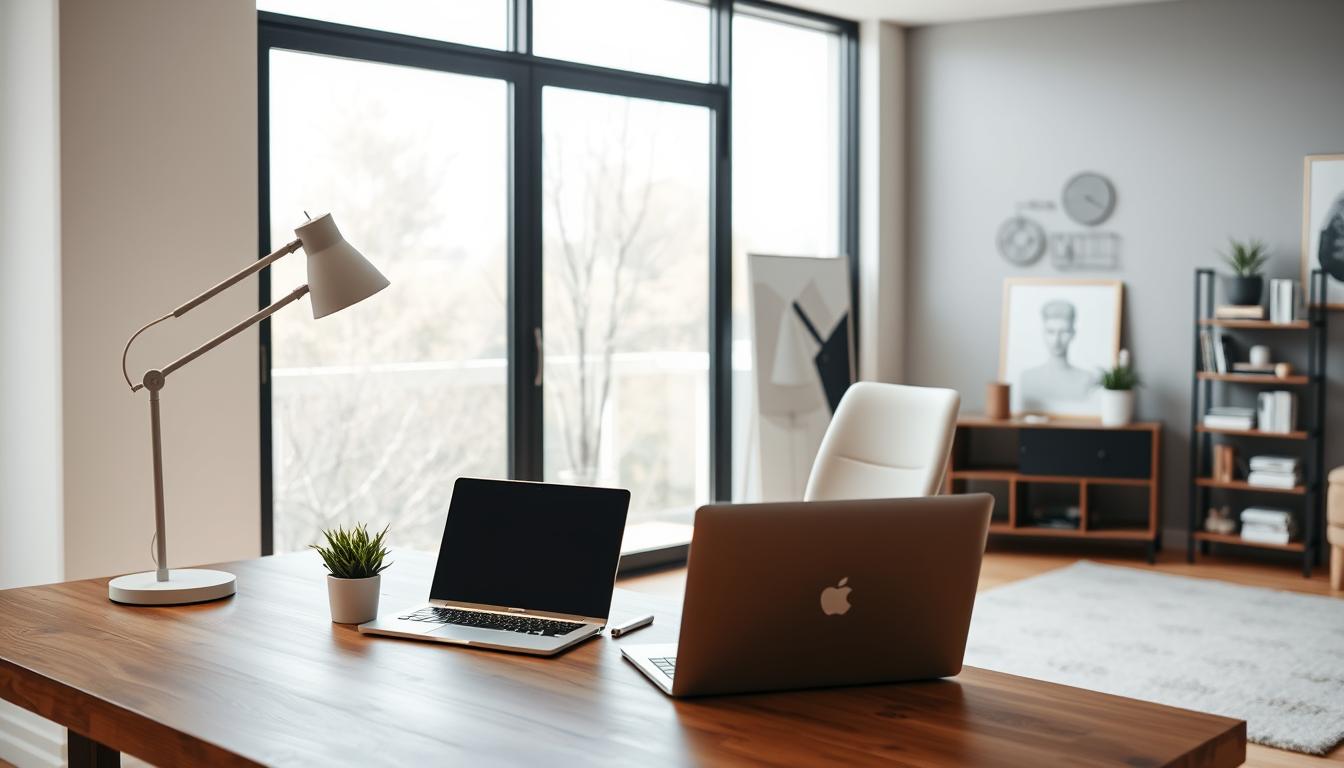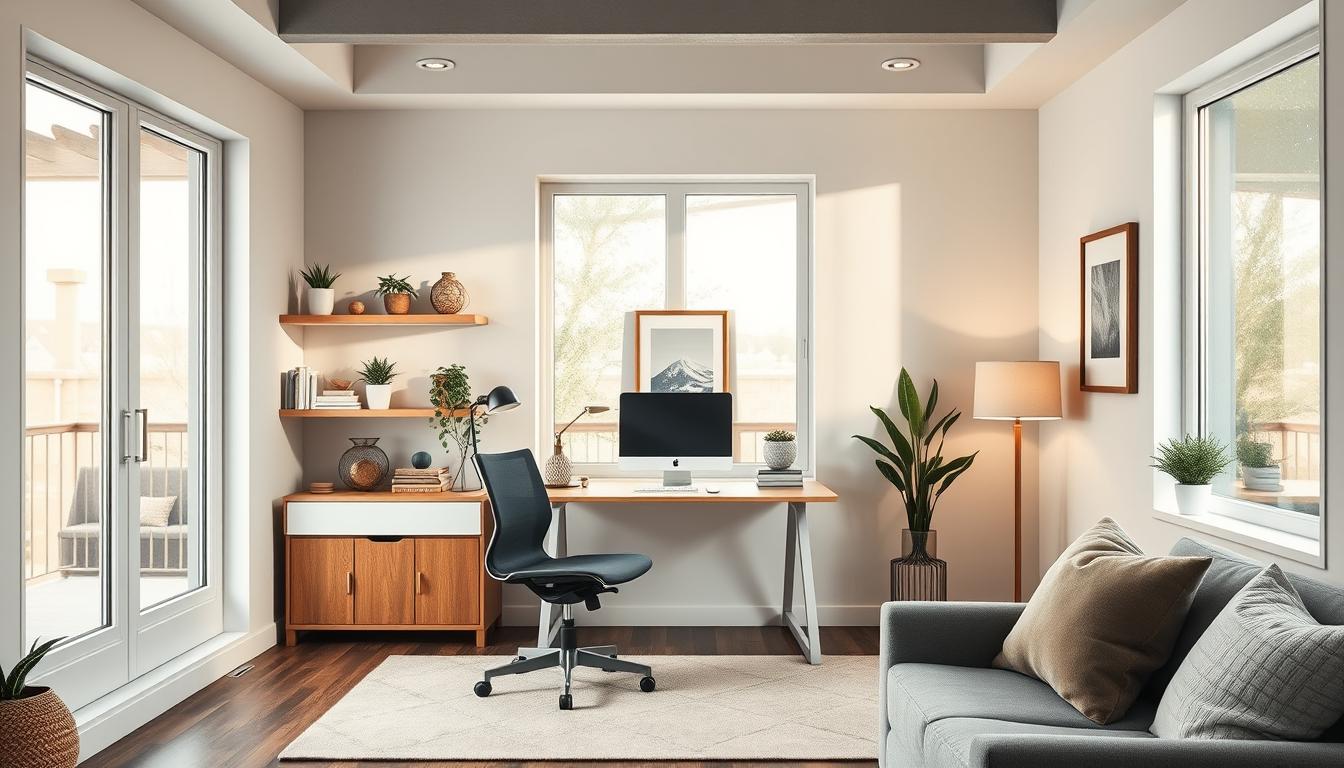Did you know a well-designed living space can make you happier and more productive? Incorporating natural light, minimalism, and texture are key trends to improve your space’s look.
We’ll dive into the best interior design inspiration to change your space. We’ll talk about design trends that can make your living area look great and work well. By following these trends, you can make a space that’s both stunning and useful.
Key Takeaways
- Maximize natural light to enhance your space
- Embrace minimalism for a cleaner look
- Add texture to create depth and visual interest
- Stay updated with the latest interior design trends
- Transform your space with our top home decor tips
1. Incorporating Natural Light into Your Home
Maximizing natural light can make your home feel bigger and more welcoming. Natural light improves the feel of your space, making it brighter and more inviting.
Tips for Maximizing Window Space
To get the most out of natural light, use your windows wisely. Keep them clear and use sheer curtains or blinds for privacy. Also, think about installing larger windows or skylights to let in more light.
Using Mirrors to Reflect Light
Mirrors are great for reflecting natural light. Place them opposite windows to bounce natural light around the room. This makes your space feel brighter and adds a stylish touch.
Choosing Light Color Palettes
Choosing the right colors is key to using natural light well. Use light colors on walls and ceilings to reflect light. Shades of white, cream, or light gray work well to keep your home feeling airy.
By following these tips, you can improve the natural light in your home. This makes your living space more welcoming and inviting.
2. Embracing Minimalism in Interior Design
Many are turning to minimalist interior design for a more organized home. It’s not just about getting rid of clutter. It’s a design philosophy that focuses on simplicity and clean lines. This creates a calm and clear living space.
Decluttering for a Fresh Look
The first step is decluttering. It frees up space and clears our minds. Decluttering means sorting through items and keeping only what’s important or useful.
To declutter, start with one area at a time. Sort items into keep, donate, sell, and discard piles. Be tough about getting rid of items that don’t serve a purpose or bring joy. This process is therapeutic and key to a minimalist lifestyle.
Selecting Essential Furniture Pieces
After decluttering, focus on furniture. Minimalist design favors simple, functional pieces that are both beautiful and practical. Choose furniture that fits well in the room and serves more than one purpose.
Essential furniture in a minimalist home includes a sleek sofa, a minimalist dining table, and a bed with clean lines. The goal is to have enough furniture to be functional without cluttering the space.
Creating Open Spaces
Creating open spaces is crucial in minimalist design. It’s not just about furniture layout but also how we use the space. Open spaces make a room feel larger and more welcoming. Leave enough space between furniture for easy movement.
Using mirrors can also make a room feel bigger. Keeping windows unobstructed lets natural light fill the room, enhancing openness.
3. Adding Texture to Your Living Space
Texture is key in interior design, making rooms more interesting and inviting. By using various textures, we can make our living spaces visually appealing.
Layering Fabrics for Depth
Layering fabrics is a great way to add texture. Use throw blankets, rugs, and pillows in different materials. For example, velvet pillows with chunky knit throws can make your living room look rich.
“Layering different textures is like composing music; it creates harmony and depth,” says an interior design expert. We can try out different fabrics, like linen or faux fur, to get the right feel and look.
Using Wall Treatments and Accessories
Wall treatments and accessories are also great for adding texture. Try textured wallpaper, wooden paneling, or a standout piece of art. Also, use vases, baskets, and decorative items in various textures to boost a room’s texture.
- Textured wallpaper can add a dramatic effect.
- Wooden accents bring warmth and coziness.
- Metallic accessories can introduce a sleek, modern touch.
Incorporating Natural Elements
Adding natural elements is a smart way to bring in texture and nature. Use natural stone, reclaimed wood, or plants. For instance, a vase with branches or a bowl of river rocks can add a natural touch.
By adding these elements, we not only enhance texture but also make our spaces more lively and engaging. Mixing textures helps us achieve a balanced and harmonious design.
4. Choosing the Right Color Schemes
Color schemes are key in interior design, affecting both looks and mood. A good color scheme can make your home feel welcoming and balanced. We’ll look at color psychology, accent walls, and trendy color mixes to pick the best for your home.
Understanding Color Psychology
Colors deeply affect our feelings and views. Understanding color psychology helps pick a scheme that looks and feels right. For example, blue calms us, while red energizes.
Think about color psychology when picking a scheme. For a bedroom, soft colors like light blue or pale green can help you relax.
Accent Walls: A Bold Choice
An accent wall adds excitement to a room. Painting one wall differently creates a focal point and depth.
Choose an accent wall color that fits the room’s palette and mood. A dark color can be dramatic, while a light one can make the room seem bigger.
Trending Color Combinations
Keeping up with trending color combinations can spark your design. Right now, monochromatic, complementary, and analogous colors are in. Monochromatic uses different shades of one color for a unified look. Complementary colors, on the other hand, offer a lively contrast.
| Color Combination | Description | Effect |
|---|---|---|
| Monochromatic | Different shades of the same color | Cohesive and harmonious |
| Complementary | Colors opposite each other on the color wheel | Vibrant contrast |
| Analogous | Colors next to each other on the color wheel | Smooth transition between colors |
By grasping color psychology, using accent walls smartly, and knowing the latest color trends, you can craft a scheme that shows your style. It will also make your home more beautiful and functional.
5. Functional Furniture Choices for Small Spaces
Furnishing small spaces requires smart choices. We must think about both looks and function. Each piece should be versatile and useful.
Multi-Purpose Furniture Solutions
Multi-purpose furniture is key for small spaces. Items like sofa beds and storage ottomans save space. They also offer more than one function.
For example, a storage ottoman can be a coffee table, extra seat, and book storage. A murphy bed is great for studio apartments. It folds up against the wall when not in use.
Space-Saving Storage Ideas
Good storage is essential in small spaces. Use vertical space with wall-mounted shelves and hooks. This clears the floor and makes rooms look bigger.
Hidden compartments in furniture are also smart. Beds with storage and coffee tables with hidden drawers are very useful.
Smart Layout Strategies
The way we arrange furniture affects a small space’s feel. We should aim for a flow that makes the space feel open.
Try a floating furniture layout to create a cozy feel. Choose furniture with legs to make rooms look bigger.
With these strategies, small spaces can become cozy, stylish, and functional.
6. Bringing the Outdoors In
Bringing the outdoors into your home can change your interior design. It makes your space calm and welcoming. Adding nature elements can make your home look better and feel more peaceful.
Indoor Plants for Every Room
Indoor plants clean the air and make your home beautiful. They come in many types, from easy-to-care-for succulents to lush greens. Choose plants like snake plants for your bedroom or colorful flowers for your living room.
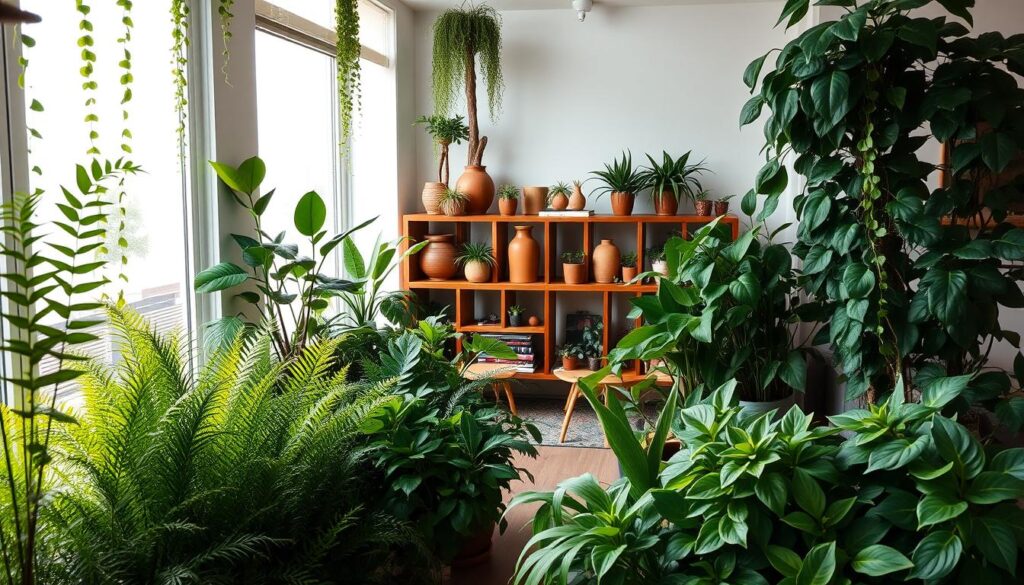
Creating a Garden Window
A garden window brings the outdoors inside. It has a built-in planter for your plants. This adds beauty and lets in lots of natural light, making your room feel bigger and brighter.
Using Natural Materials
Using natural materials in your home decor brings the outdoors in too. Think about using reclaimed wood, bamboo, or stone. These add warmth and texture. They can be for furniture, floors, or walls, making your space cozy.
Adding indoor plants, garden windows, and natural materials can make your home feel like a garden. Enjoy the peace and beauty it brings.
7. Personalizing Your Home with Art
Your home is like a canvas, waiting for the right art to make it a masterpiece. It’s more than just decoration. It’s about showing off your personality and style.
Selecting Art Pieces that Resonate
Finding art that speaks to you is key. It should reflect your experiences, emotions, or taste. Think about the mood you want your home to have. A bright piece can energize a room, while a calm landscape can soothe it.
To find the perfect art, check out local galleries, online shops, or even make your own art pieces. The goal is to feel a connection to your home through your art.
Creating a Gallery Wall
A gallery wall is a great way to show off your favorite art. Start by picking a theme or color scheme. Then, arrange your art to look balanced.
| Tips for a Great Gallery Wall | Description |
|---|---|
| Start with a central piece | Choose a standout art piece and build your gallery around it. |
| Play with different frame styles | Mixing frame styles adds depth and interest to your gallery wall. |
| Balance the layout | Try different arrangements until you find a balance that works. |
DIY Artwork Ideas
Making your own DIY art is fun and creative. You can use old materials, natural elements, or try new techniques. This way, you can make unique pieces.
Some ideas include:
- Using canvas and paint for abstract art
- Making collages from recycled materials
- Creating sculptures from wood or stone
Adding art to your home decor makes it beautiful and personal. Whether you buy or make it, the most important thing is that it speaks to you.
8. Stylish Lighting Solutions
A well-designed lighting scheme can take your living space to new heights. Lighting does more than just light up a room. It creates an ambiance that makes you feel at ease.
Layering Different Light Sources
Layering different light sources is key to a stylish and functional lighting scheme. This means using a mix of light sources like overhead lighting, table lamps, and floor lamps.
Layering light sources makes your space visually interesting and dynamic. For instance, overhead lighting provides overall light. Table and floor lamps add task lighting and warm pools of light.
“The right lighting can make a room feel cozy, inviting, and relaxing. It’s all about creating a balance between different light sources.”
Statement Fixtures that Wow
Statement lighting fixtures add elegance and sophistication to any room. A show-stopping chandelier or sleek pendant light can be the room’s focal point.
| Fixture Type | Description | Best Used In |
|---|---|---|
| Chandelier | Elegant, multi-light fixture | Dining rooms, entryways |
| Pendant Light | Single light fixture, often sleek and modern | Kitchens, living rooms |
| Sconce | Wall-mounted fixture, can be decorative or functional | Bedrooms, hallways |
Task Lighting for Functionality
Task lighting focuses on specific tasks like reading, cooking, or working. It improves your space’s functionality and reduces eye strain.
Examples include under-cabinet lighting in kitchens, desk lamps in home offices, and reading lamps in living rooms. Task lighting makes your living space more functional and comfortable.
9. The Importance of a Cohesive Theme
A well-designed home is more than furniture and decor. It’s about creating a cohesive theme that shows our personality and style. A unified aesthetic brings harmony and comfort, making our home feel welcoming.
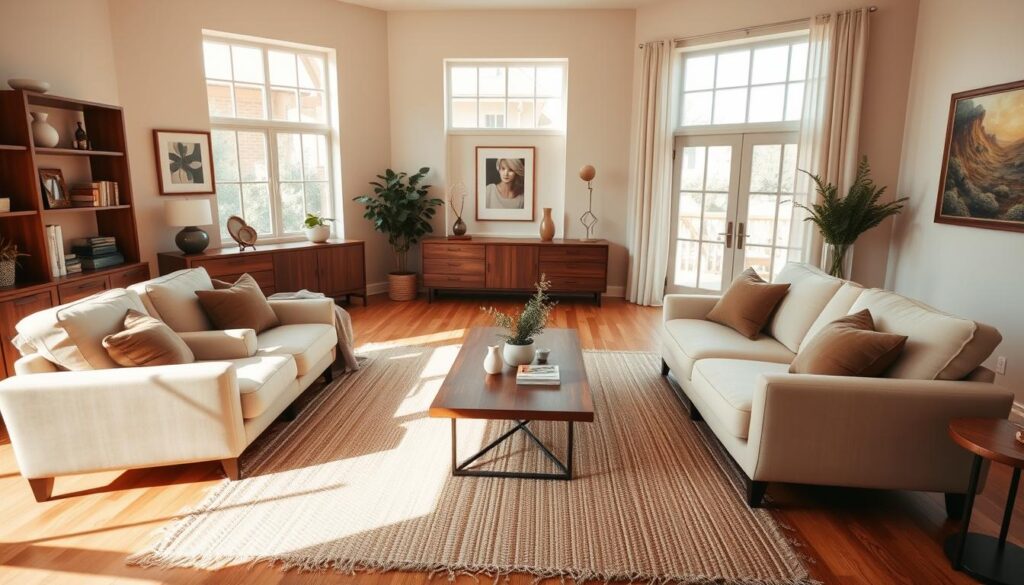
To achieve this, we must focus on a few key elements. First, picking a theme that reflects us is essential. This means understanding our personal tastes, lifestyle, and preferences. This way, our space will look great and feel like home.
Picking a Theme That Reflects Us
Choosing a theme that matches our personality is the first step. We should think about what we love, like a certain style, color, or texture. This personal touch makes our home unique and shows who we are.
Balancing Different Styles
Creating a cohesive theme can be challenging, like balancing different styles. We might love a modern sofa but also a vintage armchair. The trick is to find common ground, like color or texture, to blend styles harmoniously.
We can use a neutral color palette as a base and add pops of color or textures with accessories. This way, we can mix styles without cluttering the space.
Staying Consistent with Decor Choices
Consistency is crucial for a cohesive theme. It doesn’t mean everything must be the same. Instead, we aim for a consistent feel in our home. We can do this by repeating design elements, like colors or materials, across rooms.
This creates continuity and flow, making our home feel connected and harmonious. It’s about finding a balance between consistency and creativity, showing our personality while keeping a unified look.
In the end, a cohesive theme turns a house into a home. It reflects our identity and personal style. By choosing a theme, balancing styles, and staying consistent, we create a space that is both beautiful and meaningful.
10. Revamping the Kitchen for Modern Living
A modern kitchen is more than a place to cook. It’s the heart of the home. Making it modern can make your life better. We’ll look at key things to think about for a kitchen makeover.
Open Concept Designs
Open concept kitchens are very popular now. They remove walls to join your kitchen, dining, and living areas. This makes your space feel bigger and is great for gatherings.
Benefits of Open Concept Designs:
- Increased natural light
- Improved flow and circulation
- Enhanced social interaction
Functional Kitchen Islands
Kitchen islands are essential in modern kitchens. They add counter space, storage, and sometimes seating. Think about what you need: more storage or a place to eat?
Key Considerations:
- Size and scale in relation to your kitchen
- Functionality: storage, prep space, seating
- Style and material to match your kitchen aesthetic
Smart Storage Solutions
Good storage is key in a modern kitchen. Smart solutions keep your space organized. Options like pull-out drawers and wall-mounted cabinets can help.
| Storage Solution | Description | Benefit |
|---|---|---|
| Pull-out Drawers | Drawers that slide out for easy access | Easy access to utensils and cookware |
| Wall-mounted Cabinets | Cabinets mounted on walls for storage | Maximizes floor space, keeps items within reach |
| Pot Rack | A rack to hang pots and pans | Frees up cabinet space, adds a decorative element |
By adding open concept designs, kitchen islands, and smart storage, you can make a modern kitchen. It will look good and work well, whether you’re cooking alone or for a crowd.
11. Creating Relaxation Zones at Home
Turning your home into a relaxation haven is simple. Just a few tweaks can make your space peaceful, helping you relax and recharge.
Designing a Cozy Reading Nook
A cozy reading nook is perfect for getting lost in a book. Start by picking a comfy chair or sofa for a quiet corner. Add a floor or table lamp for soft, warm light.
Throw in pillows and a throw blanket for extra coziness. Consider a side table or stool for your book and drinks. For a special touch, add plants or fresh flowers. For more ideas, check out these meditation room ideas.
Setting Up a Home Office Oasis
Work and relaxation blend when you work from home. A home office oasis keeps you focused and calm. Choose a quiet spot with few distractions.
Get a comfy, ergonomic chair and a desk that fits your needs. Plants or fresh flowers add a natural feel. Use calming colors and soft lights for a soothing vibe.
Incorporating Spa-Like Bathrooms
A spa-like bathroom is the ultimate relaxation spot. Start by decluttering and removing unnecessary items. Add a rainfall showerhead or freestanding tub for luxury.
Use calming colors and soft lights for a peaceful feel. Plants or fresh flowers bring in nature. For extra indulgence, try scented candles or essential oils.
| Relaxation Zone | Key Elements | Benefits |
|---|---|---|
| Cozy Reading Nook | Comfortable seating, soft lighting, pillows, throw blanket | Reduces stress, promotes relaxation |
| Home Office Oasis | Quiet workspace, ergonomic chair, calming colors, plants | Improves focus, boosts productivity |
| Spa-Like Bathroom | Rainfall showerhead, freestanding tub, calming colors, soft lighting | Promotes relaxation, reduces stress |
12. Sustainable Interior Design Ideas
Transforming our living spaces is key, and so is thinking about the environment. Sustainable interior design is more than a trend. It’s a step towards healthier, eco-friendly homes.
Eco-Friendly Choices
Choosing eco-friendly materials is vital in sustainable design. We can make a big difference by picking materials that are recycled or sustainably sourced. This inspires us to think outside the box for our homes.
Energy Efficiency
Energy-efficient lighting is another way to help the planet. LED bulbs use less energy and last longer than old bulbs. They’re a smart choice for a greener home.
Upcycling and Repurposing
Upcycling and repurposing furniture cuts down on waste and adds character to our homes. It gives old furniture a new life. This way, we create a space that’s both sustainable and stylish.
By adopting sustainable design, we can make homes that are beautiful and good for the planet. Let’s use these ideas to make our spaces better for our health and the environment.
